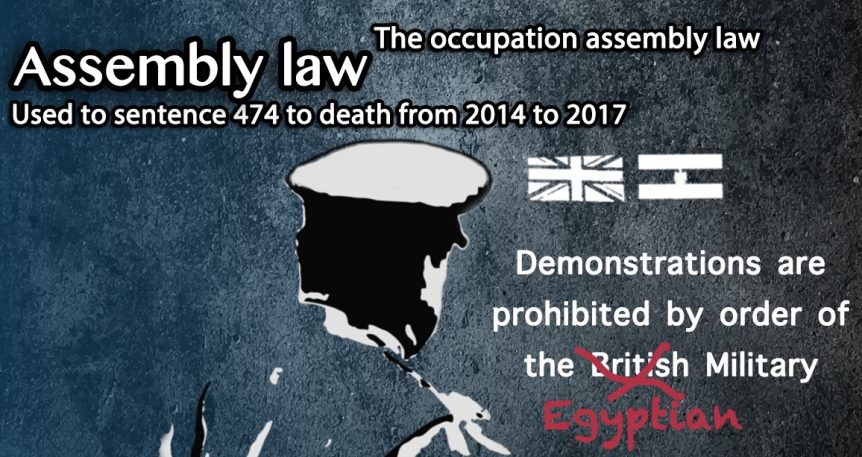An ongoing challenge against the Egyptian government’s unlawful use of the repealed British occupation-era Assembly Law ended in defeat on January 18th in the Administrative Court’s first circuit. The court’s decision to dismiss the lawsuit represents justice denied yet again for the thousands of Egyptians who remain imprisoned under the Assembly Law (no.10 of 1914), and represents a dire risk for those currently facing prosecution for demonstrating, especially in the aftermath of last year’s unprecedentedly sweeping arrest campaign following protests in late September. The Cairo Institute for Human Rights Studies is deeply concerned by the court’s decision while reaffirming its commitment to continuing its campaign to genuinely abolish this archaic, repressive law, nearly a century after it was unanimously repealed by the Egyptian Parliament.
Filed nearly three years ago on January 31st 2017, the lawsuit sought an injunction against the government’s application of the Assembly Law, and a publication – by the president – of the law’s repeal in the Official Gazette. The judiciary’s marked bias towards the administration of the current president Abdel Fattah al-Sisi was made apparent by its ruling in favor of the Egyptian state, despite its inability to provide the slightest amount of evidence validating its continued use of the obsolete law. This stood in stark contrast to the abundant evidence provided by the plaintiff (CIHRS) proving that the law is null and void given its unanimous 1928 repeal by both chambers of Egypt’s legislature.
With the Administrative Court ruling in favour of the state on the flimsy basis of judicial precedent while ignoring the overwhelming evidence substantiating the plaintiff’s case, the three-year political and legal deadlock ended. During the course of those three years, the disposition of the lawsuit was repeatedly and deliberately disrupted and prolonged by the Egyptian government as it clung to this colonial-era law, which it considers vital to the legal framework of the modern Egyptian state – mainly in its capacity as a repressive tool eliminating all forms of opposition to Sisi’s unprecedentedly brutal authoritarian rule.
Akin to all previous post-independence Egyptian governments, the government of Abdel Fattah al-Sisi relies on the Assembly Law to deny citizens their right to peacefully gather and demonstrate. Thousands of citizens have been detained for simply exercising this fundamental right, including and especially political activists, human rights defenders, and journalists. Under Sisi, the Assembly Law’s repressive capacities have been complemented by Law no. 107 of 2013, known as the Demonstration Law. The assembly and demonstration laws are often used in tandem against protesters; the two laws’ sweeping capacities to round up large groups of people was most recently exemplified in the aftermath of the protests in late September 2019, in which over 4,000 people were detained.
The Assembly Law is not only used by the Egyptian government to deny its citizens their right to protest, but it is also used to deny them their right to life. Between 2014 and 2017, 474 people were sentenced to death on the basis of the law, which – by negating the principle of individual criminal responsibility – enables Egypt’s judiciary to indiscriminately issue mass death sentences against hundreds of persons. Under the Assembly Law, it is only necessary for an assembly to have occurred (defined as five or more persons gathering without a security permit) in order to render all participants and persons calling for it—even those who did not participate—guilty of “assembling” and any other crimes that may have been committed by any individual participant during the assembly, including crimes punishable by death. Soaring numbers of Egyptians have either been executed or are awaiting execution for crimes they did not personally commit that occurred during an assembly.
The enactment of the Assembly Law’s repeal is critical to the freedom of the thousands currently imprisoned under it; if the law were to be effectively abolished, all detainees convicted under it would be granted the right to a re-trial while being entitled to government compensation for the time they spent unjustly behind bars. It is in the name of justice for these detainees that CIHRS and its allies in Egypt’s human rights movement do not accept the Administrative Court defeat as a final defeat, and continue their campaign to absolve the Assembly Law of its wrongful and illegal role in the modern Egyptian state. It is unpardonable that the very same law used by the British colonial government 106 years ago be used by the government of Abdel Fattah al-Sisi against Egyptian citizens today.
Share this Post

